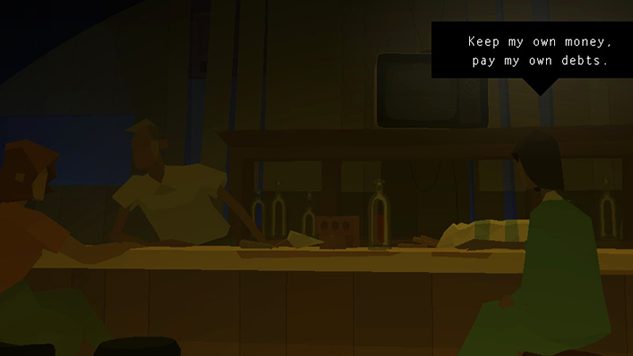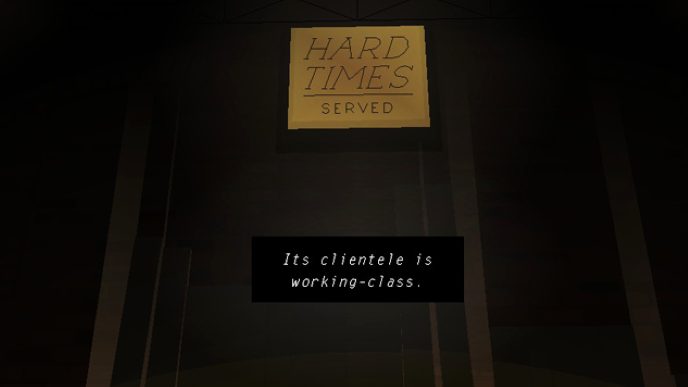Kentucky Route Zero Is the Rare Story that Sheds Light on the Experiences of Millennials of Color
Games Features Kentucky Route Zero
Like many people, I first played Kentucky Route Zero when the TV edition came out this past January. Despite its fame, it isn’t a game that immediately clicked with me and a few other first-time players I know. But, if it clicked, it interestingly clicked around the same time: during “The Entertainment,” the interlude between episodes two and three. I suspect it might be due to its discussions on family, class immobility and a debt experience that many millennials—especially people of color—can relate to so deeply years later.
“The Entertainment” is split into four scenes that take place in a bar called The Lower Depths. At the start of the second scene walks in a woman named Pearl Slade, fit in professional clothing that contrasts the everyday casual clothes of the barkeeper and patron chatting with him. “Are the old folks here?” she says as she sits down. Throughout every minute she is on screen, there’s a visibly anxious energy to her; she’s unable to stop tapping the table. I recognize it immediately because I, too, stim. My leg is perpetually bouncing, for it’s the only way I know how to handle the anxiety in my body at all times.
The “old folks” she’s referring to are her parents, Rosa and Lawrence, who frequent the bar and supply their alcoholism with Pearl’s money. She describes them as deadbeats, though I feel this is a description that applies to Lawrence more. Rosa has worked at a supermarket store for the past 11 years, only just recently having been told she’s “maybe eventually management material. “Keep your chin up,” her boss tells her. I empathize with her. In her I see my mother, who works at a supermarket and suffers screaming customers, supervisors without a shred of empathy, and the physical pain that comes with consistently carrying heavy objects and standing in one place for hours without end; who was told from her first day at work that there was no chance of her moving up in the company (at least she knew from day one! how lucky!). I see the millions of women who work two, three times as hard as the men in their workplaces and are stringed along with promises of promotions and financial security only to never get them.
Rosa knows this, and it’s why she’s hesitant in contrast to Lawrence’s insistence on celebrating the occasion by downing Hard Times whiskey. A part of me understands him, too—understands his desire to find any escape from the systems that oppress brown and black families like this one, restricting them from social mobility and opportunities for stability.
But I most strongly understand Pearl and the responsibility that has fallen on her to take care of her parents. She’s the ambassador of a new financial technology at a local pawn shop, which utilizes her as the one dark-skinned clerk in the office to make poor black and brown people—who struggle to get loans otherwise—feel safe in coming to the business with their debts. Debts are something she knows well enough to be an ambassador in—not just because it’s her actual job, but also because she takes care of her family’s debts. She’s paid to supply their addiction and minimize their bar tabs and debts. “I know debt, Harry,” she tells the bartender. “I see it all day. It’s all around me, like a thick, gray, fog. It’s in the air I breathe.”
She knows it so well because she lives the reality of many millennials of color today.

According to a Merrill Lynch and Age Wave report, 70% of early adults received financial support from their parents in the last year. The same report indicates that roughly a quarter of millennials receive financial support from their parents, with 13% saying their parents pay all of their rent or mortgage and 10% reporting their parents pay for their student loans. But this is largely the reality of more white than non-white middle class millennials, for Hispanic and Black millennials face an additional layer of economic struggles that prevent them from getting ahead.
Black and Hispanic millennials are less likely to receive financial help from their parents. Additionally, their parents are more likely than white parents to expect financial support, with approximately 80 percent of black parents and 70 percent of Hispanic parents having these expectations. Various studies have shown that people of color are unable to save as adults largely because they financially support close family.
This is the life that Pearl lives as a black woman who is expected to financially support her close family members in a world in which black women make 63 cents compared to every white man’s dollar. She is one of many millennials of color who, “during key times in their lives when they should be building assets, [are] spending money on basic necessities and often helping out family. Their financial future is a rocky one, and much of it comes down to how much—or how little—assistance they receive.”
“I just have to save a bit more and then I go to California,” she reasons. “I’ll be a real clerk.” But, as a woman of color who knows all too well what it’s like to earn to support your parents, I can’t help but wonder if she’ll ever get to save the amount of money she needs; if she’ll get to escape. Unlike Pearl, I don’t deal with my parents abusing substances. I love my parents more than anything in the world, and would do anything for them. But, throughout this interlude, I felt my heart ache for Pearl because I understood her.
I understood the feeling of needing to extract yourself physically from home to feel like you can succeed. Evelyn, the other customer sitting at the counter, asks her if she’s ever been in love, and Pearl responds with a quick, “nope.” I understood being an adult and not having experienced that, for if you’re too busy trying to survive—and help your parents survive—there’s no time for love. I understood the deep-rooted anxiety that makes her stim, that is hard to escape because its root is money and capitalism and a lack of resources—things that can’t be fixed through therapy, which she likely can’t afford anyway.
I understood that she and I are two of the millennials Umair Haque speaks of in the piece “(Why Millennials are) America’s First Poor Generation.”
“They [millennials] don’t have money. They don’t have opportunities. They don’t have safety nets. They don’t have cushions. They don’t have mobility. They have to rely on their parents—if they’re lucky—and maybe live at home well into their middle age. They can’t afford things like healthcare, education, housing, and bills—they simply don’t earn enough money, never have, and never will. They can’t even afford to have basic relationships and marriages and partnerships anymore—one of the truest signs of real poverty. What they do have is debt, decline, stagnation, and despair.”
The Merrill Lynch report showed that 75% of the early adults they interviewed say becoming financially independent from parents is the key indicator of being an adult. So, if millennials of color are struggling to help their families, let alone become financially independent, when do we get to feel like adults? When will Pearl feel like an adult? When she moves to California? If she ever moves to California? When she has enough to pay for her parents’ tab and clear that debt? When she has her own debts instead of someone else’s?
With “The Entertainment,” Kentucky Route Zero sheds light on a specific kind of experience—on the kind of experience that doesn’t easily come up when you try to find information on the millennials of color all over this country who must provide for their families; who have no illusions of home ownership or an extravagant yearly vacation because basic survival is hard enough; who often put their dreams on hold because they feel an obligation to help their parents, many of whom have sacrificed so much for their children to have dreams. Stories about America’s working class so often exclude those at the bottom, which tend to be poor people of color. I’m glad that Kentucky Route Zero doesn’t fall into this trap in its mission to highlight the invisible people of America.
Natalie Flores is a freelance writer who loves to talk about games, K-pop and too many other things.